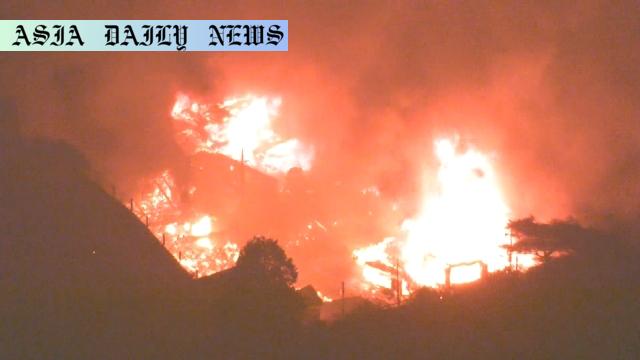Forest Fires: Over 3,300 evacuated in northeastern Japan as flames engulf eight communities in Ofunato, resulting in one fatality.
- Forest fires in northeastern Japan have led to 3,300 evacuations.
- One fatality reported in Sanrikucho Ryori due to the fires.
- Firefighters are battling flames in eight affected communities.
- At least 84 houses and buildings have been damaged as per initial reports.
- Many areas remain unassessed, and dry air advisories persist in the region.

Introduction: Forest Fires Ravage Ofunato
In a heart-wrenching turn of events, forest fires have been devastating the city of Ofunato, located in Iwate Prefecture, northeastern Japan. Since Wednesday, flames have spread rapidly across the region, resulting in widespread destruction, the tragic loss of life, and significant displacement of residents. Authorities and emergency responders are working around the clock to contain the inferno, but the full extent of damage remains uncertain as the fires continue to blaze.
Communities in Flames: A Detailed Overview
The fires initially broke out in two districts of Ofunato City—Akasakicho Attari and Sanrikucho Ryori—before rapidly spreading to eight neighboring communities. Preliminary reports indicate that at least 84 houses and other buildings have been destroyed. However, local authorities warn that the number could increase significantly as several affected areas are yet to be assessed. The region’s history of natural disasters only amplifies the severity of this situation. Notably, the same areas were among those devastated by the 2011 tsunami, which claimed numerous lives and destroyed hundreds of homes.
Casualty Reports: A Sobering Reality
This disaster has not come without loss. As of Thursday morning, a body was discovered in the Sanrikucho Ryori area, one of the hardest-hit districts. Preliminary investigations suggest the individual likely perished in the rapidly moving flames. Efforts are underway to identify the victim as police and firefighters continue their search for others who may have been injured or chose to delay evacuation during the chaos.
Evacuations and Relief Efforts
In response to this escalating crisis, over 3,300 residents have been evacuated from the affected areas. As of 3 p.m. Thursday, approximately 467 people had taken refuge in designated evacuation shelters within Ofunato City. Authorities have prioritized their safety while also striving to provide them with necessary support and resources during their time of need. Emergency responders are focused on containing the fires to prevent further escalation.
Environmental Factors Complicating Efforts
The region’s dry conditions have significantly exacerbated the situation. Since February 18, dry air advisories have been issued for southern coastal areas of Iwate Prefecture. These advisories highlight how flammable the environment has become due to prolonged dry air. Strong winds have further fueled the flames, making firefighting efforts increasingly challenging for local authorities. It remains critical to monitor weather patterns in the coming days to determine if more help will be required.
A Historical Perspective: Resilience Amid Adversity
This is not the first time these communities have faced natural disasters. In 2011, the same districts were among those devastated by a massive tsunami following a major earthquake. Sanrikucho Ryori alone experienced waves over 13 meters high, with some exceeding a staggering 30 meters. The community suffered 27 casualties during the disaster and lost 330 homes entirely. While such resilience highlights the character of these communities, recurrent disasters place a heavy toll on their physical and emotional well-being.
Uncertain Future: What Lies Ahead
The full aftermath of these forest fires remains to be seen. With flames still active in many areas and several locations yet to be assessed, the number of damaged properties is expected to rise. The affected community’s recovery will likely be long and arduous, requiring continued support from governmental and humanitarian organizations. Additionally, this incident serves as a critical reminder of how unpredictable natural disasters can be, emphasizing the importance of preparedness and swift response strategies.
Conclusion
The forest fires in northeastern Japan are a stark reminder of nature’s destructive power. As the residents of Ofunato face yet another disaster, their resilience and determination serve as an inspiration. Continuous support from both local authorities and international organizations will be crucial as these communities strive to rebuild their lives and homes yet again.



Commentary
A Tragic Reminder of Nature’s Power
The news of the devastating forest fires in northeastern Japan is both tragic and sobering. It is heartbreaking to see communities that have already endured so much in the past, like the destruction wrought by the 2011 tsunami, once again facing significant adversity. It raises profound questions about how we as a global community respond to and support areas that are frequently affected by natural disasters.
Reflections on Community Resilience
One cannot help but admire the resilience of the people in Ofunato and other affected areas. Their history of recovery and rebuilding after the 2011 earthquake and tsunami showcases a strength and determination that is deeply inspiring. However, repeated exposure to such disasters takes its toll. It is a sobering reminder of the importance of sustainable community planning and disaster preparedness, especially in regions prone to such events.
Calls to Action and Global Solidarity
This tragedy also underscores the need for a global conversation about climate change and its increasing impact on weather conditions. Dry air advisories and strong winds have clearly exacerbated these fires, and such environmental factors may become more common in a warming world. Governments and international organizations must join hands to implement proactive measures to reduce the risk of such events. Moreover, providing immediate financial and logistical support to affected communities is crucial to help them recover and rebuild.
Conclusion
As we reflect on this tragedy, we must also ask ourselves what more can be done to protect vulnerable communities and ensure no one is left behind during times of crisis. With heartfelt condolences for those affected, let us move forward with determination to aid Ofunato and use this as an opportunity to learn and prepare for future challenges.